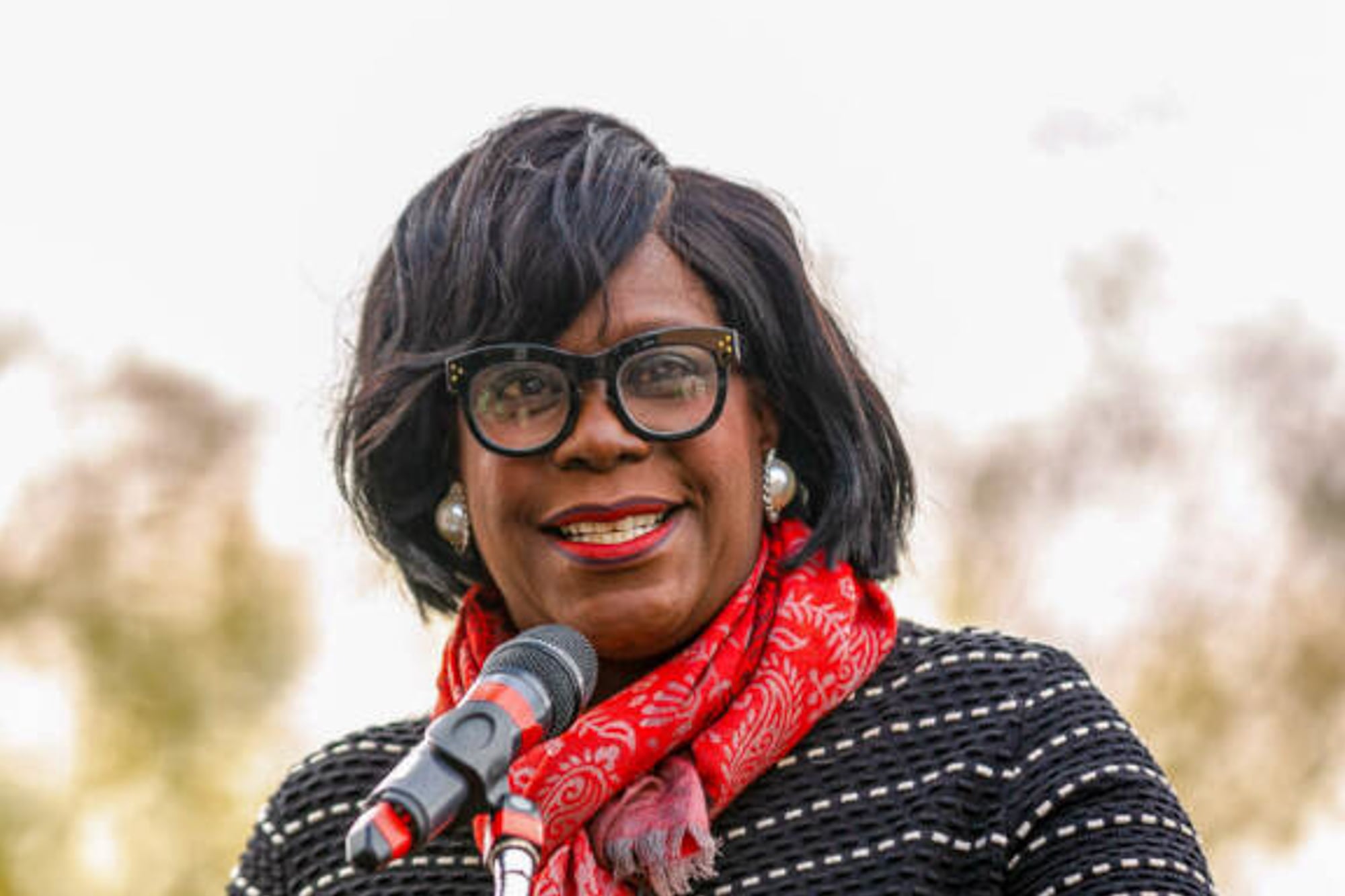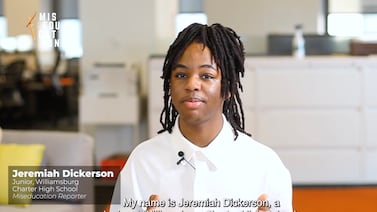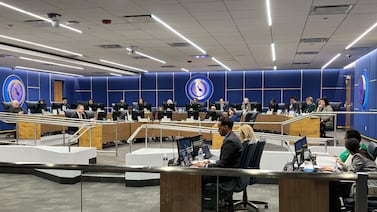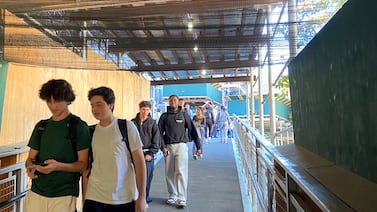Cherelle Parker’s Democratic primary election win on Tuesday means she is all but certain to be the city’s 100th mayor and first woman to hold the office.
So what would a Parker administration look like for schools?
Parker, who used to be a public school teacher in New Jersey, has proposed keeping school buildings open year-round and lengthening the school day. She’s said she wants to heal the splintered relationship between the Board of Education, the district, and city officials. And she has positioned herself as a bipartisan dealmaker capable of negotiating more money for the city from Harrisburg to help Philadelphia schools fix crumbling buildings and recover from COVID-interrupted learning.
Parker’s ascension to the mayoral seat is not a done deal. She will face off against Republican nominee David Oh in November’s general election. But in Philadelphia, where registered Democrats outnumber Republicans nearly seven to one, her primary win means she’s heavily favored.
Parker was not available for an interview on Wednesday due to a medical issue, her campaign spokesperson Aren Platt said.
But based on her comments and proposals made on the campaign trail and her responses to our mayoral questionnaire, it’s possible to project what Parker in the mayor’s office could look like for education.
Parker’s big-ticket education idea: Year-round school
Parker’s boldest education campaign proposal was to “create full-day, full-year education for all students in Philadelphia.” According to her campaign website, Parker said more time in school would allow students to pursue extracurricular activities, sports, and other “enrichment” opportunities, while also providing parents and caregivers more child care flexibility.
She’d pay for it “by leveraging existing funding” and “with new state and city funding,” according to her campaign site.
It’s not immediately clear what this would look like in practice or how much it would cost. School districts have tried year-round schooling to bolster academics and avoid overcrowded classrooms, among other reasons. But the change can also increase district costs, complicate family schedules, make it harder for teenage students to get summer jobs, and hurt tourism and other industries.
The Los Angeles school district turned to year-round schools as enrollment grew in the 1980s, but by 2015, just one school there still had such a schedule, according to Education Week.
Perhaps the biggest unanswered question is whether the Philadelphia Federation of Teachers, which endorsed rival Helen Gym in the mayoral campaign, is on board with the idea. At minimum, officials and the union would have to renegotiate the district’s teacher contract, which expires in August 2024.
PFT President Jerry Jordan offered his congratulations to Parker in a statement Wednesday saying “the first female Mayor in our city’s history will be an important role model for our youth—especially young Black girls.” (Parker is Black.)
At the same time, PFT spokesperson Hillary Linardopoulos said Wednesday that the union was not ready to comment on the idea of year-round school, or any of Parker’s education positions.
Parker confronts tricky school board politics
Philadelphia’s mayor has no direct governing power over schools. But the mayor does appoint the nine Board of Education members, who in turn hire the superintendent and oversee all policy and budgetary decisions made by the district. The board is also the sole authorizer of charter schools in the city.
Parker said she wants a superintendent and board that reflect “the diversity of the city, wields the passion for elevating our school system to the prominence that it could be, and whose primary priority is creating quality seats for all of Philadelphia’s students.”
Under outgoing Mayor Jim Kenney, a simmering tension has developed between the school board, the district, and city officials around issues of asbestos remediation, funding needs, and community engagement.
In response to our mayoral questionnaire, Parker said she plans “to be a very active Mayor when it comes to appointing and dealing with the School Board and educating our children in general.”
She said the superintendent, board, and the mayor’s office “cannot work in silos or impose an ‘Us vs. Them’ mentality.”
Whether this means she will completely remake the board from scratch or keep some or all of the current Board members remains an open question. The board members’ terms will expire when Kenney leaves office, but they’ll continue to serve until their replacements take over.
Optimism that Philly schools will get more funding
Philadelphia city schools are perpetually seeking more funding. Earlier this year, a Commonwealth Court judge declared Pennsylvania’s school funding system unconstitutional and ordered the General Assembly to overhaul it. According to an Education Law Center and Public Interest Law Center analysis, the district schools need an estimated $1.1 billion more each year from the state to properly educate its students.
What’s more, the district doesn’t have the ability to raise tax revenue on its own. The school board is dependent on city and state officials to allocate the funding necessary to operate the district.
Parker, a former state representative, has said she is well-positioned to negotiate with state lawmakers in Harrisburg to get Philadelphia schools the money they need.
On her campaign website, Parker touts her position as former chairwoman of the Philadelphia delegation in Harrisburg. She also says she was able to secure a plan to send the district $148 million and prevent layoffs of some teachers and support staff in 2013, when the “District was on the verge of financial collapse.”
Parker is also optimistic that the court case over the state’s school funding formula will result in more money for the city schools.
“There is almost no scenario where the Philadelphia School District does not receive more funding,” Parker said in her responses to our questionnaire.
She also said she would be open to increasing the city’s share of funding for the district. Currently schools receive 55% of the city’s property tax revenue; she said she would increase it to 58%, which she said would bring an additional $50 million to the district.
“We must prioritize investing in our education system and if that means increasing our share of funding, my Administration will be prepared to do that,” she said in her questionnaire.
In a list of priorities for the next mayor, the school board singled out funding as a top issue.
Some school buildings need to be ‘torn down’
Several school buildings have closed this year due to damaged asbestos, and district leaders have said the growing crisis means more school closures may be coming.
In response to our mayoral questionnaire, Parker said “it is unconscionable that we ask anybody, but especially children, teachers, and other workers to go to buildings with environmental, structural, and other issues.”
On her plans for remediation, Parker said “many of our school buildings need immediate attention but some are too far gone and need to be torn down, period.”
She also joined the chorus of elected officials and education advocates calling for a comprehensive plan from the district. “While the school district is already implementing an improvement plan, it’s not happening quickly enough for kids and parents who don’t have options, and for the first time in my experience, the money is there to get it done,” Parker said.
Parker: State should restore charter school reimbursements
The Philadelphia Board of Education is the sole authorizer of charter schools in the city. It has come under scrutiny concerning racial bias amid allegations from Black-led charter schools that board members have targeted them for closure.
Parker hasn’t said outright whether she wants the number of charter schools to grow, shrink, or stay the same. As a state representative, Parker signaled her support for a moratorium on new charter schools.
Parker said in her mayoral questionnaire responses that she would “insist” the state legislature reinstate the charter school reimbursement line item in the state budget that was removed by former Gov. Tom Corbett in 2011. The line item sent state funds to districts to compensate for “stranded costs” because some of their per-pupil state aid went to charters; about half the total went to the Philadelphia district.
Striking that line item “pitted public schools against charter schools unnecessarily by leaving public schools no way to defray the overhead and stranded costs that remained the same despite smaller enrollments,” Parker said in her questionnaire. “Reinstating this will grow the pot of funds and allow for more opportunity for Philadelphia’s students no matter what type of school they attend.”
Getting more librarians into schools
Philadelphia had the worst ratio of school librarians to students in the country as of 2020, according to data from the Pennsylvania Association of School Librarians. The association said there were just six school librarians in a district with more than 125,000 students and 215 district-operated schools.
Parker said she “would ensure that every district school has a certified librarian by drawing upon our funding streams and using my voice to amplify the need for them being more prevalent in our schools.”
Carly Sitrin is the bureau chief for Chalkbeat Philadelphia. Contact Carly at csitrin@chalkbeat.org.
Dale Mezzacappa is a senior writer for Chalkbeat Philadelphia, where she covers K-12 schools and early childhood education in Philadelphia. Contact Dale at dmezzacappa@chalkbeat.org.






